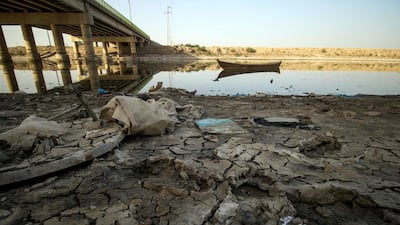Iraq’s Water Minister Jamal Adili on Thursday laid the blame for Basra’s toxic water scandal on neighbouring Iran.
The southern oil-rich province saw tens of thousands of people hospitalised in July last year due to scarce potable water.
As more and more people fell ill, residents and politicians blamed Baghdad. The dire situation and lack of basic services, they said, was symptomatic of the years of neglect and corruption within the central government.
In the Green Zone, however, some point the finger at Tehran.
“Basra’s crisis of contaminated water was caused by Iran blocking two rivers which reduced the flow of water to Iraq,” Mr Adili said during the sixth annual Sulaimani Forum.
Thousands poured onto the streets demanding water and proper services in a wave of unrest last summer that saw building in Basra quite literally go up in flames.
Speaking on a panel titled "Spotlight on water resources" Mr Adil on Thursday said he expected the problem to intensify as the summer months bring about sweltering temperatures of up to 50 degrees Celsius.
Nearly two-thirds of Iraq's surface water originates outside the country's borders, leaving it vulnerable to the actions of its neighbours, particularly Iran and Turkey.
Euphrates-Tigris rivers rise in the highlands of eastern Turkey. The Tigris is also fed by five major tributaries originating in Iran. Yet, dams in Turkey and Iran caused water level to fall to an all time low last year.
Iraqi officials warned last year that Tehran is attempting to divert the course of the Tigris river, expressing particular concern about the decline in water levels.
Tehran announced that it needs the water to boost agricultural production.
“Rivers were here before borders. People deserve their fair share of water. We have a right to this water and we must take our right,” Mr Adili said at The American University of Iraq, Sulaimani.
The minister added that “Iran has been even harsher than Turkey” when it comes to restricting water to Iraq.
It is estimated that nearly 30 per cent of the Tigris annual flow originates in Iran through two rivers, Sirwan and Alwant.
Officials have said that the construction projects by Iran on the Sirwan river, a tributary of the Tigris, has affected the water reaching the Tigris.
The UN Human Rights agency (OHCHR) reported an increase in contaminants in the water from sewage and industrial waste as well as high levels of salt in the water in August 2018.
The OHCHR expressed concerns over the lack of water treatment plants in the region.
In a moment of optimism, Mr Adili told the audience that Iraq had been “blessed by a good rainy season” this year. “Strategic water reserves have doubled since last year and no farmer should face shortage for crops”.
Water levels in Iraq’s marshes have been the highest since 1990, Mr Adili said.
But as well as a lack of safe drinking water Basra and its oil-rich province suffer from constant power cuts, a stagnant economy, poor health services, widespread corruption, unemployment and an agriculture sector devastated by drought
In Basra on Thursday angry Iraqis took to the streets again in frustration over the city’s collapsing infrastructure.
Protesters demanded the governor of Basra and the head of the provincial council to step down for failing to fulfill promises made to them.


